Redditor Gets Accused Of Disrespecting Ancestors When Reveals Family’s Weird Inbreeding History To Their Cousin
In some parts of the world, eccentric family traditions are the norm. These traditions can take many forms and are often a result of isolated and closed communities where families intermarry over generations.
Such practices, while socially acceptable within these communities, can lead to inbreeding and its associated risks. Such is the story of OP's family, a tapestry woven tightly with threads of consanguinity.
This wasn't due to cultural or religious obligations; rather, it was a peculiar quirk that set them apart. Over the years, it had become a common practice for family members to marry within the family, often to cousins.
The gene pool had remained relatively closed, leading to a situation where even OP's parents were first cousins once removed. A side effect of this inbreeding was visible in many of OP's relatives.
A noticeable number of them had physical and/or intellectual disabilities, a consequence of shared genetic material over generations. This fact became a topic of conversation at a family gathering when a young cousin asked OP why so many of their relatives were disabled in some way.
OP responded with the truth, explaining that the disabilities were a result of their ancestors' frequent intermarriages within the family. Taken aback, the young cousin commented with a hint of disgust that she would never want to marry OP. OP took it lightly, laughing it off and thinking nothing more of it.
However, this offhand comment stirred up a bit of a storm. The cousin's mother later called OP, expressing her concern that OP's statement had caused her daughter to lose respect for their ancestors.
This sentiment was echoed by several other family members, leaving OP to question if they were the one at fault.
OP asks:
 Reddit
RedditOver the years, it had become a common practice for family members to marry within the family, often to cousins.
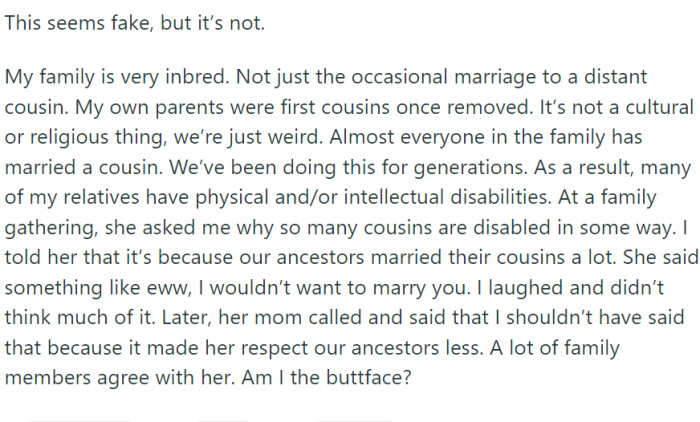 Reddit
RedditWas OP in the wrong for revealing the truth about their family's unusual tradition and its consequences? Or was the blame misplaced, a result of a community unwilling to face the consequences of its long-standing practices? The answer remains uncertain, highlighting the complexities of family traditions and their impacts on subsequent generations.
"You're shining a critical light on something that your family obviously believes is OK. "
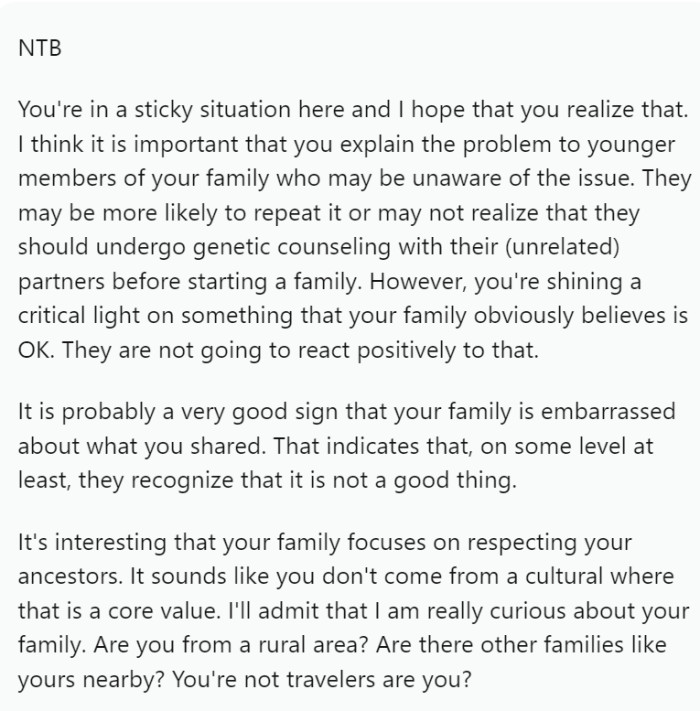 Reddit
RedditThis is a weird family
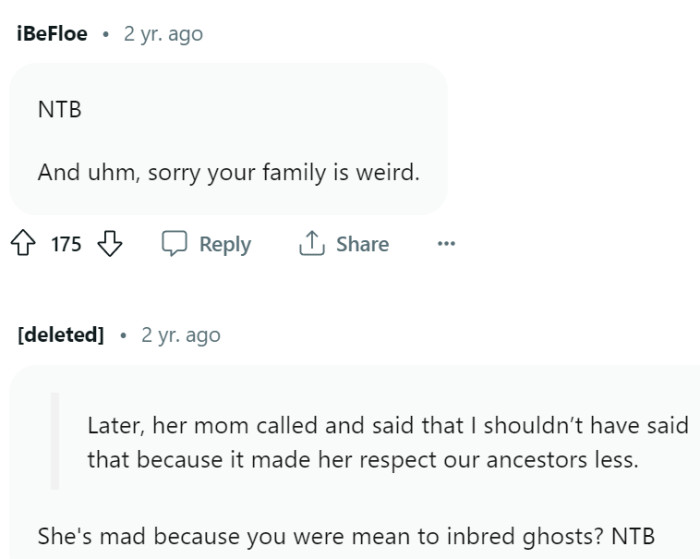 Reddit
RedditThe thought alone is disgusting.
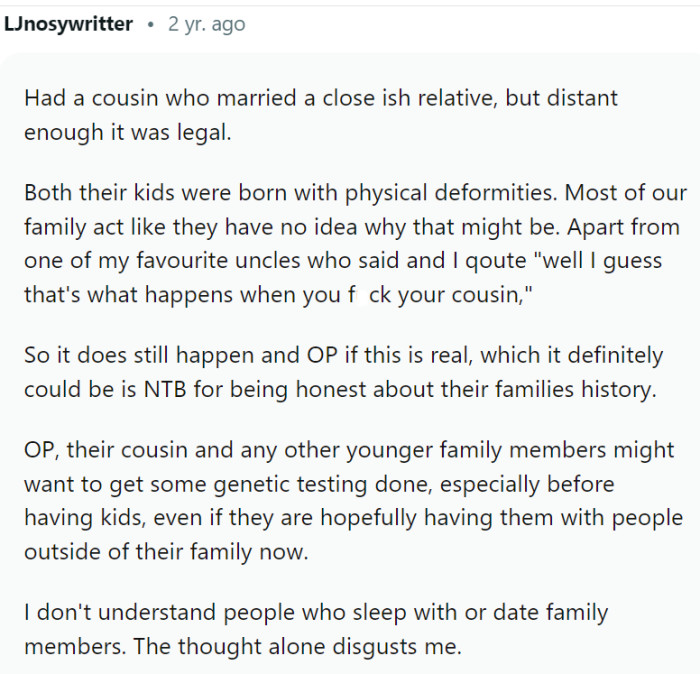 Reddit
RedditIt is wrong
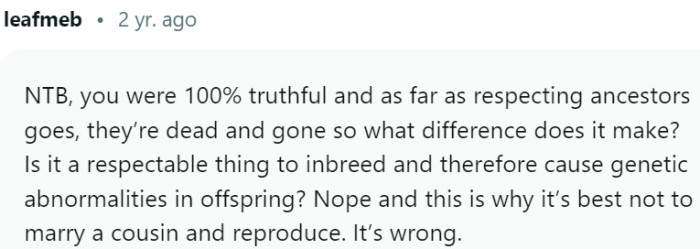 Reddit
RedditPeople should know the risks
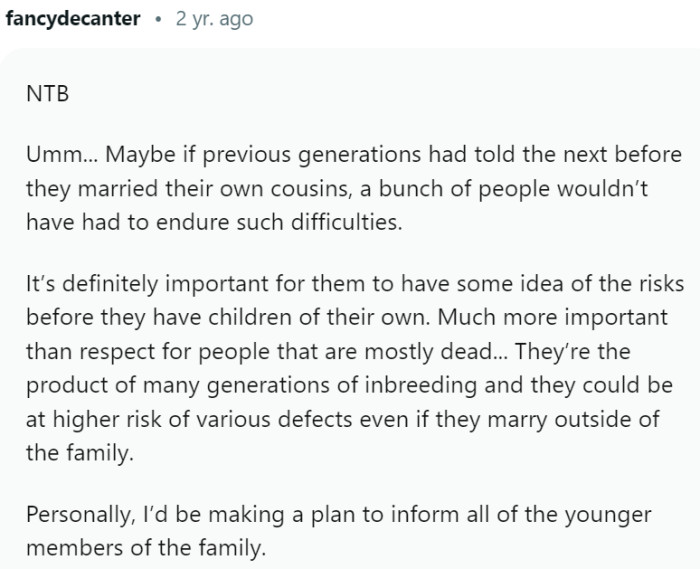 Reddit
Reddit
This is a good question:
 Reddit
Reddit
OP's situation provides a stark reminder of the consequences of sustained inbreeding within families. Historically, reasons for such practices range from maintaining familial wealth and social status to the geographical isolation of communities.
But, it's critical to understand that inbreeding can lead to an increased risk of genetic disorders and disabilities, as clearly seen in OP's family. While it's understandable that traditions hold a strong place in people's lives, the health and well-being of future generations should always be a top priority.
Thus, it's essential to question and reconsider practices that might have harmful implications. OP, in this instance, was simply being honest about the family's history and the consequences it had on its members.
Such frankness can be challenging to accept, especially when it sheds light on uncomfortable truths. But transparency and open discussions are often the first steps toward change.
If the pattern continues unchecked, future generations might continue to suffer from the same avoidable health issues. Therefore, while one might empathize with the backlash OP received from their family members for revealing the truth, it's also important to recognize the courage it took to address the elephant in the room.
The reaction of OP's family members might reflect their struggle to reconcile their respect for their ancestors with the visible evidence of the impact of their choices. This tale serves as a poignant reminder that traditions should never come at the cost of health and well-being, and societal norms should continually adapt to reflect this principle.




